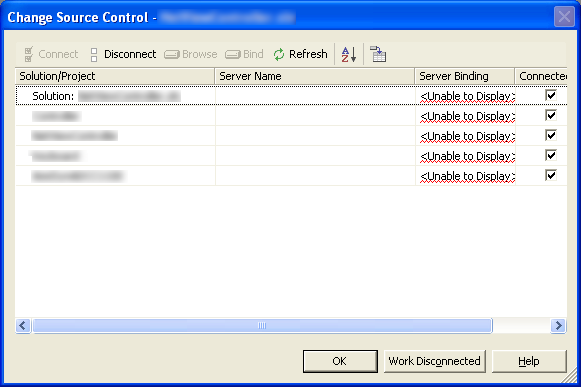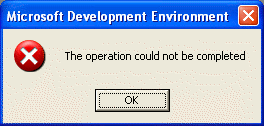Back when I used to code demos with friends as a pastime (1995 or so) we
would slave away on three or four PCs, at best interconnected with null-modem or
parallel (a.k.a laplink) cables; whenever someone would have a breakthrough we'd
reconnect the machines and shift sources around (sometimes opting to use
modems or floppies instead). Eventually we'd get to a more or less complete set
of codebases and integrate them into a single production.
That process could best be described as hectic. I'm amazed
we ever managed to get any work done, particularly in the absence of automatic
merge tools such as Araxis
Merge; the number of times we would accidentally overwrite or
modify each other's code, accidentally delete an object file or some other
stupid mistake was astounding. With that baseline in mind, when I was introduced
to SourceSafe back when I was serving in the Israeli army I was appalled. The
concept of a singular repository for sources (with write access to everyone on
the team, no less) seemed incredibly stupid, although in retrospect I couldn't
tell you why. SourceSafe's (severe) problems aside, I'd expect the fundamental
concepts of source control to strike a chord with me immediately, but it took a
while for that to happen; over the years I've developed pretty rigid standards
of working with source control - what should or should not be checked in, how
long is it OK to check out a shared file exclusively (more or less the only
option with SourceSafe...) and how to organize the repository effectively.
Fast forward to 2006. I'm working on a project that has several seperate
components; the project, which is actually version 2.0 of a certain
product, is kept in a central source control repository along with its
dependencies (libraries, documents, installables) and everything seems to be
fine. Only it isn't. The first problem is that the project was originally
developed for an external company which uses Perforce as its source control provider of
choice. We then brought the codebase back to Monfort and set out to rework the existing
components and develop new ones. This means that while large portions of the
code were being worked on, others remained completely untouched - in other
words, some projects were imported into our source control system (Vault) and others were
not. This proved to be very annoying when I had to re-integrate and test
some version 1.0 code today; it's worth noting that Visual Studio is anything
but graceful when it comes to handling unavailable providers or incomplete
bindings:

So
much for verbosity, but at least I can Work Disconnected...

...
right after I click on OK again.
That was only the first hurdle. The second was an apparent lack of attention
on a certain developer's part (sigh), who forgot to add installations for
certain 3rd party dependencies to the repository. Fast forward another fourty
minutes or so (DevExpress's installers
suck) and I was finally on my way to a working test build.
At that point, a new developer on the project approached me with some
compilation issues. This was pretty rudimentary stuff - installing a
public/private key container, path variables, 3rd party installations etc.,
but the guy couldn't be expected to know how to do any of this
stuff, let alone what needs to be done or where to get the
required files. Which brings me to the conclusion of this here rant:
- When you import a project into your development environment (source
control, build system, back up, etc.) take the time to get (re-)acquainted
with the codebase and make any necessary conversions. It'll pay off in the
long run,
- Always keep all dependencies safely tucked away in your source
control repository. That's as close to a file server as you are going to get,
it's properly backed up (isn't it?) and the files are kept close to
their target audience - developers on that particular project.
- A "Developer Workstation Setup" document is an absolute must-have.
Saves everyone a lot of time and headache.
- Try and maintain behavioural consistency between developers on a given
project. This doesn't have to (and preferably won't) extend to indentation and
code formatting issues, but some sort of check-in, documentation and
dependency resolution policy is important, if not for the project than at
least for your medical bill.